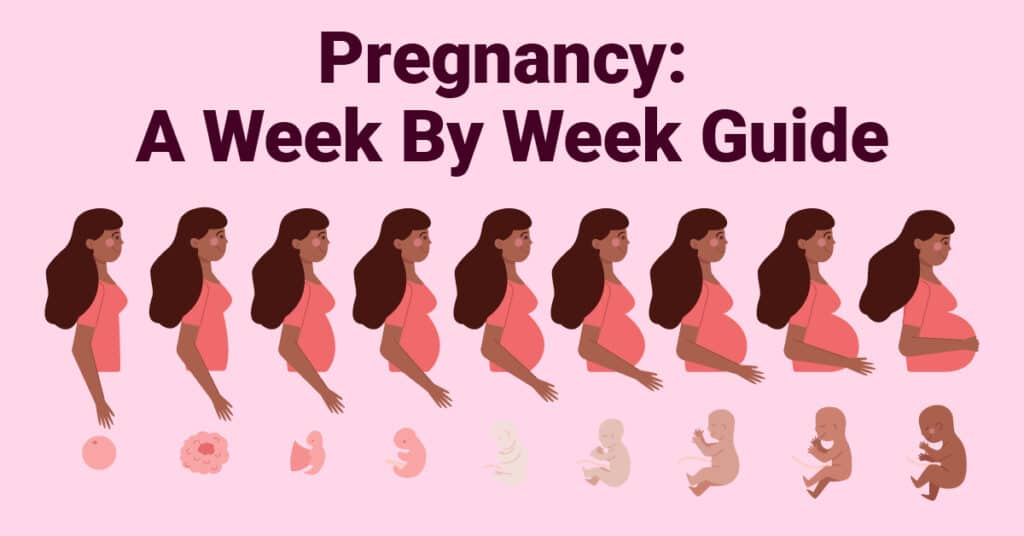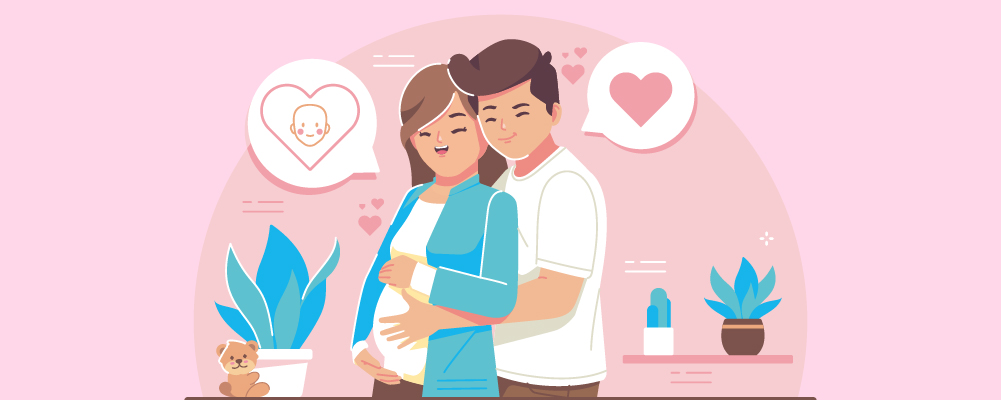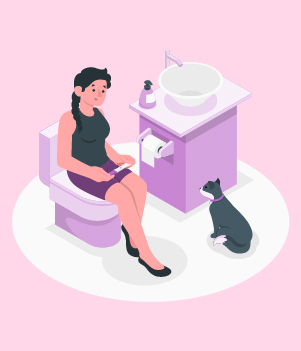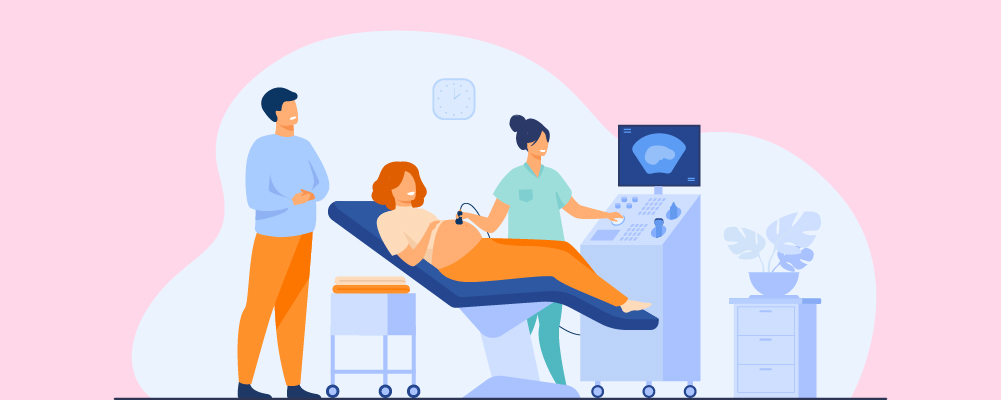Pregnancy: A Week By Week Guide
- Team Mom Informed author

We're supported by moms. When you buy through links on our site, As an Amazon Associate, I may earn a commission.
Pregnancy can be a difficult and overwhelming time. But it can also be magical and miraculous. Pregnancy is one of the most natural processes that a human body can go through.
Yet it is only in the last two decades or so that we have begun to truly understand gestation. And even today, we do not know and understand everything about pregnancy.
So there are some other very unexciting aspects of pregnancy. Which definitely need their own mention and consideration. So, to help you better understand exactly what goes on during pregnancy, here is a week by week guide to the process.
Table of Contents [show]
First Trimester

Week 1 And 2 - Getting Pregnant
The first few weeks of a pregnancy very rarely have any kind of impact. Most people will not know that they are pregnant until several weeks have passed. Generally speaking, the earliest a person will know that they are pregnant is at 2 weeks. This will be enough time to notice a missed period.

Week 3 - Baby Is As Big As A Vanilla Seed

At this stage, the egg has been released through the fallopian tubes and, if it has been fertilized, becomes a zygote. The zygote begins to split and becomes a blastocyst.
Week 4 - Baby Is As Big As A Poppy Seed
In week 4, the blastocyst implants into the wall of the uterus. This is also when the placenta begins to develop and the blastocyst turns into an embryo.

Week 5 - Baby Is As Big As An Orange Seed

Week 5 is when the embryo starts to develop a nervous system and a string of blood vessels connects the embryo to the uterus. This will later become the umbilical cord.
Week 6 - Baby Is As Big As A Sweet Pea
This is when the embryo begins to change shape. There is a bulge where the heart is developing and where the head is developing. There might also be smaller bulges that will become the arms and legs, a small appendage that looks like a tail, and dimples where the eyes will develop.

Week 7 - Baby Is As Big As A Blueberry

During week 7, the brain begins to grow rapidly and will be bigger than other parts of the embryo. Eyes and ears will begin to develop.
Week 8 - Baby Is As Big As A Raspberry
At week 8, the embryo becomes a fetus. The legs will grow longer, but will not have distinctive features yet. At this stage, the womb will be the size of a lemon.

Week 9 - Baby Is As Big As A Green Olive

At this stage the face will begin to form more distinctively. The hands and feet also become more distinctive. And major internal organs begin to grow.
Week 10 - Baby Is As Big As A Prune
By week 10, the fetus begins to grow even more defined features. This includes facial features as well as bones.

Week 11 - Baby Is As Big As A Strawberry

At this stage, the bones of the fetus are fully defined. The placenta is almost fully developed and the main body will begin to grow more rapidly. The head will be around ⅓ of its overall size.
Week 12 - Baby Is As Big As A Lime
By week 12, the placenta will be fully formed. And so will the fetus. This means that in only 3 months, the fetus is fully grown. From this point onward, the fetus will simply continue to grow and develop.

Week 13 - Baby Is As Big As A Lemon

At 13 weeks, the fetus still has its eyes closed and is continuing to grow and develop. The head and body become more balanced. The head will now be around twice as large as the body.
Baby Growth
Baby Growth
During the first trimester, the fetus develops a lot more than people would expect. This is an incredibly important period of the pregnancy as it is when almost every feature begins to grow. After the 12th or 13th week, the baby mostly begins to grow larger and more matured.
The fetus will grow the vast majority of its bones, internal organs, eye sockets, limbs, and sex organs.
Hair And Nails
In the first trimester, the fetus is yet to develop any hair. This usually happens within the first few weeks of the second trimester. At the end of the first trimester the fetus has grown almost every feature. And it is during the second and third trimesters that it becomes bigger and more mature. Hair growth is part of this maturation process.
At around week 11, nail beds will begin to develop. Then, at around week 12, the nails themselves begin to grow. The nails won’t be fully developed until close to the end of the pregnancy.

Digestive System

During the first trimester, the fetus will begin to develop all of its internal organs. They will all be at the very beginning stages and will not yet be able to function. The fetus will have developed three layers of cells. From the inside outward, these are the endoderm, the mesoderm, and the ectoderm. These are called the germ layers.
During the middle and later stages of the first trimester, the primary tubes of the digestive system begin to develop. This is the tube from the mouth to the anus. The stomach is also beginning to develop. But the abdomen does not have space for the intestines. So these temporarily develop in the umbilical cord.
Sense Of Touch
The sense of touch develops remarkably early. This is usually around the 7th or 8th week in the first trimester. By the 11th week, the fetus will begin moving around inside the womb. The development of a sense of touch is incredibly important.
Once they have been born, touch is one of the first ways that a baby will communicate and interact with the world. This is one of the reasons why skin to skin contact is so important after birth.

Eyesight

During the first trimester, the fetus will begin to develop eyes. The eyes develop around the 7th and 8th week of pregnancy.
By this stage, the main parts of the eye will begin developing. This includes the iris, cornea, retina, pupil, and lens. They will become fully formed in a matter of days.
By week 11, the fetus will have developed eyelids. But they will remain closed until around the 26th week of pregnancy.
Heart
The heart begins developing in the mesoderm around the 5th week of pregnancy. The very basics of the circulatory system also begin to develop at this time. By the 6th week of pregnancy, the heart begins to beat. It won’t be until around the 10th or 11th week that you will be able to hear the heartbeat. But this varies for each person and each pregnancy.
At this stage, the heart is beating at around 110 beats per minute. This will rise to between 150 and 170 beats per minute by around week 8. This is twice as fast as an adult heart rate.
Physically, the heart will develop as a collection of tubes. This continues to develop and the cells which will eventually become the heart valves develop around week 4, if not earlier.

Sense Of Taste

During the first trimester, the sense of taste has not yet developed. The cells that will go on to become taste buds and the tongue are present. But they are not yet fully developed.
By around week 8, the neurons that will aid the sense of taste begin to connect with the mouth. But the sense of taste itself will not have yet started to develop.
Body Changes
Tender, Swollen Breasts
Tender or even painful breasts are one of the first symptoms you will experience. They can be an indicator of pregnancy in the first week or two. So this can suggest that you are pregnant before you miss a period. But as tender and swollen breasts are common throughout the menstrual cycle, it is not a foolproof sign.
The reason why breasts are so tender and swollen so early on is because of (unsurprisingly) hormones. In the early weeks of pregnancy, your body is being flooded with hormones. And your breasts are also being prepared to produce milk for the baby.

Nausea With Or Without Vomiting

Even if you are unfamiliar with every other symptom of pregnancy, you will very likely know about the nausea and vomiting. This is often referred to as “morning sickness”. But, unfortunately, it is not really relegated to the mornings.
Some people will experience a constant feeling of nausea throughout the first trimester. This is also due to the sudden surge in hormones in the body. Morning sickness can also be the result of a reduction in blood sugar levels. It can be triggered by the smell of certain foods, smells, and even excess salivation. Sometimes, it just seems to pop up randomly.
Increased Urination
This is another very common symptom of pregnancy. This can occur throughout all three trimesters and after giving birth. It usually begins around the 4th week of pregnancy.
Frequent urination is another symptom which can be attributed to those hormones that are shaking up your body. But it is also due to the growth of the fetus and the womb. This puts pressure on the bladder. Causing you to feel the need to urinate more regularly.

Fatigue

As you are growing a full human being, fatigue is to be expected. Fatigue is a common side effect of pregnancy. But that doesn’t mean that it should be ignored. Many people will continue with their everyday lives and work until very close to giving birth. But, if you are feeling excessively tired, this is your body telling you to slow down.
In the first trimester, your body is going through a huge number of changes. And is growing the main features of the fetus. So it’s necessary to take rest when your body tells you that it needs it.
Food Cravings And Aversions
Pretty much everyone has a story about the weird foods (or sometimes inedible items) that they or someone they know craved during pregnancy. This is incredibly common. And so is food aversion. Something you once loved to eat can suddenly become disgusting to you.
Food cravings and aversions vary dramatically from person to person. And can even change for the same person during different pregnancies.

Heartburn

This can also be caused by hormonal changes, as well as the pressure the womb is placing on the stomach. Heartburn is a common side effect of pregnancy.
Constipation
Once again, we can blame hormones for this side effect. More specifically, the hormone progesterone. The increase in progesterone relaxes the muscles and causes them to work more slowly. This can cause constipation as the lower intestine slows down.

Second Trimester

Week 14 - Baby Is As Big As A Nectarine
At this stage, the fetus is around 3 inches long. It will begin ingesting small amounts of the amounts of amniotic fluid.
Week 15 - Baby Is As Big As A Pear

At around 15 weeks, the fetus will begin to hear muted sounds. Its eyes will remain closed, but they will become more sensitive to light.
Week 16 - Baby Is As Big As An Avocado
At week 16, facial features will begin to move. But the fetus cannot yet control them itself. The hands also begin to move, touching each other and making fists.

Week 17 - Baby Is As Big As A Large Onion

From week 17, the mouth will begin to open and close. And the lines on the fetus’ hands will begin to develop. This means that it has its own fingerprints.
Week 18 - Baby Is As Big As A Small Cucumber
Around week 18, the baby will begin responding to noises. These will be with small movements that you have a very small chance of feeling.

Week 19 - Baby Is As Big As A Mango

Little develops during this stage of the pregnancy. But the baby continues to grow and put on a small amount of fat
Week 20 - Baby Is As Big As A Sweet Potato
At this stage, the baby’s skin becomes covered in a greasy white substance called vernix.
Week 21 - Baby Is As Big As A Banana

At this stage, the baby becomes bigger than the placenta. The baby becomes covered in soft small hairs called lanugo.
Week 22 - Baby Is As Big As A Bell Pepper
The baby begins a pattern of sleeping and waking. But this does not necessarily line up with the sleep pattern of the parent.

Week 23 - Baby Is As Big As A Grapefruit

At week 23, the baby begins practicing breathing movements.
Week 24 - Baby Is As Big As A Pomegranate
At this point, the internal organs of the baby will have developed enough for them to potentially survive outside the womb. However, these babies are still premature and will need assistance.
Week 25 - Baby Is As Big As An Eggplant
At this stage, the baby is moving around a lot. The baby will respond to loud noises with movements which you will possibly be able to feel.
Week 26 - Baby Is As Big As An Acorn Squash
At around the 26th week, the baby’s eyes will open for the first time, and they will start blinking.
Week 27 - Baby Is As Big As A Cabbage
At this stage, the baby’s brain, digestive system, and lungs will be fully developed but not yet mature.
Baby Growth
Hair, Skin And Nails
During the second trimester, the nails and nail beds of the baby continue to grow and develop. The baby will not yet have hair on its head. But it will develop a soft layer of hair across its whole body. The skin will be wrinkled and not yet fully grown. But the baby will begin to develop the distinctive lines, especially on its hands. This includes developing its fingerprints.

Digestive System

Around halfway through the second trimester, and so halfway through the pregnancy, the internal organs become fully developed. However, they are not yet fully mature. The baby will also begin to ingest small amounts of the amniotic fluid.
Senses
During the second trimester, the baby begins to hear loud noises and will respond to them with movement. Their eyes will also become more sensitive to light. Their eyes will begin to open for the first time and they will start blinking.

Heart

The main development of the heart takes place in the first trimester. During the second trimester, the heart continues to mature. The heart rate will also begin to slow down. But will still be faster than a fully grown human’s
Brain
Around halfway through the second trimester, the baby’s brain is fully developed. But not yet fully mature. It will continue to grow throughout the pregnancy.
If the baby were to be born at this stage, they would be able to survive with medical assistance. If this happens, there is a higher chance of the baby developing a disability.

Body Changes
First Trimester Symptoms May Persist

Throughout the second trimester, some of the symptoms of the first trimester may persist. This includes the swollen and tender breasts, heartburn, and frequent need to urinate. However, symptoms such as morning sickness are likely to fade away.
Congestion
Congestion is a surprisingly common symptom that occurs during the second trimester. This is due to the increased amount of blood circulating in your body. This can cause blood vessels to swell, causing congestion

Swelling Of Ankles And Feet

As your baby continues to grow, your body will take the strain. This often involves your ankles and feet swelling. For some people, this is only minor. Whereas others find it difficult to fit into their shoes. The experience will vary for everyone. It is primarily caused by your body retaining more water.
Sensitive Gums
Once again, we can blame those pesky hormones. The increase in hormones can make your teeth more vulnerable to plaque. This can cause your gums to become swollen, more sensitive, and even bleed.

Leg Cramps

Leg cramps, especially at night, are common in the second and third trimesters. Unfortunately, no one really knows why they happen. But it can be due to changes in blood circulation. And because you’re carrying some extra weight.
Aching In Lower Abdomen
Pain in your abdomen during pregnancy can be scary. But these are relatively common during the second trimester. That said, if you are ever concerned about pain during your pregnancy, it’s always a good idea to get it checked out. It is better to be safe than sorry.
One of the main causes of aching in the lower abdomen is round ligament pain. The round ligament is the tissue which holds the womb in place. This stretches as the pregnancy progresses. And so can cause aches, pains, and cramps.

Varicose Veins

Varicose veins can appear at any time in your pregnancy. But they become larger as the pregnancy progresses, and you become heavier. It is very likely that they will recede after the birth.
Dizziness
Dizziness can occur due to the growing pressure your uterus is placing on your blood vessels. Lying down on your back can help with this.

Forgetfulness

“Baby brain” is something which a lot of people talk about. The research is (like many other medical issues that primarily affect women) very limited.
Weight Gain
Weight gain is an unsurprising side effect of pregnancy. You will become heavier as the baby grows. But you also need to put on extra fat to help feed your baby once it is born. Most people will put on between 22lb to 26lb. The majority of the weight is put on around week 20.

Third Trimester

Week 28 - Baby Is As Big As A Head Of Lettuce
By week 28, the baby will be a little over 2lb. It is fully formed and continuing to grow.
Week 29 - Baby Is As Big As A Head Of Cauliflower
At this stage the baby is continuing to grow and move around.
Week 30 - Baby Is As Big As A Bunch Of Broccoli
At around week 30, the baby will begin to suck its fingers or thumb, they will become plumper, and the vernix and lanugo will begin to disappear.

Week 31 - Baby Is As Big As A Coconut

The lungs are more developed at this stage, but the baby cannot breathe for itself until week 36. The eyes can also now focus.
Week 32 - Baby Is As Big As A Cantaloupe
At week 32, the baby might start turning so that its head is toward the pelvis ready for birth.

Week 33 - Baby Is As Big As A Butternut Squash
By this stage, the brain and nervous system are fully developed.
Week 34 - Baby Is As Big As A Pineapple
At this stage, the baby’s bones, other than the skull bones, begin to harden.
Week 35 - Baby Is As Big As A Spaghetti Squash

At this stage, the baby is in a position ready for birth. They will move around but in a smaller space.
Week 36 - Baby Is As Big As A Bunch Of Kale
By this stage, the lungs and digestive system are fully formed.

Week 37 - Baby Is As Big As A Canary Melon

At 37 weeks, a pregnancy is considered full term. The baby is ready to be born, but the pregnancy can continue for longer.
Week 38 And 39 Baby Is As Big As A Mini Watermelon
Around this time, the baby’s head will become engaged and further down in the pelvis, ready for birth.

Week 40 And 41 - Baby Is As Big As A Small Pumpkin
At this stage, the lanugo will be almost entirely gone. Although some babies are still born with patches.
Week 42 - Baby Is As Big As A Watermelon
By week 42, many babies will have been born naturally. They are fully formed and ready to be born.
Baby Growth
Final Bone Growth
During the third trimester, your baby will go through its final development. They will have the majority of their features. These will now be maturing. The bones, other than the skull bones, are hardening. They will still be soft, especially the skull, to allow for a smooth birth.
Hair, Skin And Nails

Some babies are born without any hair at all. Whereas others have a full head of hair. So hair growth can vary widely. The skin in the third trimester will become smoother and less wrinkled as the baby puts on fat. But it will still be a little wrinkly when they are born.
Digestive System And Brain
By the third trimester, the important internal organs are all fully formed and continue to mature.

Five Senses
By the third trimester, the baby will already be able to hear and taste. The eyes will also be opening and fully developed. From around week 28, the baby will also be able to smell.
Body Turns Downward
One of the major changes in the third trimester is the turning of the baby. Babies spend most of the pregnancy with their heads toward the chest. During the final weeks of the third trimester, the baby will turn around. The head will move deeper into the pelvis. And the baby will begin to curl up. They will still move around, but will have less space to do so.

Body Changes
First And Second Trimester Symptoms

The symptoms of the first trimester will usually be gone by the third trimester. Some can continue, as every pregnancy varies, but this is unlikely. Some of the second trimester symptoms which continue are swollen ankles and feet and other side effects of weight gain.
Stretch Marks
Stretch marks are a fact of life, whether you have a pregnancy or not. Stretch marks will appear around your belly. But also in other areas of your body as you become heavier.

Braxton Hicks Contractions

Braxton Hicks are essentially fake contractions. Their cause is not entirely understood. But there are ways to recognize the difference between Braxton Hicks and real contractions.
Hemorrhoids
Hemorrhoids are common during pregnancy due to the increased pressure on your lower body. They can also be due to the increased amount of blood in the body.

Crazy Dreams

Having wild dreams during pregnancy is incredibly common. This can be because of the increased stress and anxiety that many people experience during pregnancy. Especially close to the birth. Researchers believe that dreams are the mind’s way of working through issues in the subconscious. So, your brain is trying to work through these feelings of stress and anxiety.
Clumsiness
A combination of hormones, fatigue, and weight gain can all contribute to clumsiness. A lack of coordination is a common side effect from the beginning of pregnancy. But this is much more common as your belly becomes bigger and heavier.

Lack Of Bladder Control

As your baby becomes bigger and moves toward your pelvis, it will press further on your bladder. This can make controlling urination very difficult. Urinating when you cough, sneeze, or laugh is very common during the third trimester. As well as after giving birth.
Leaky Breasts
During your third trimester, you might notice your breasts leaking a yellowish fluid. This is called colostrum. This is a side effect of your body preparing for giving birth and needing to feed a baby. It is very normal.

Summary
Tracking the growth of your baby, even on a small week by week scale, can make you feel so much closer to them. You will be aware of how your child is transitioning from a collection of cells to a whole person.
Source: https://mominformed.com/pregnancy-a-week-by-week-guide/

